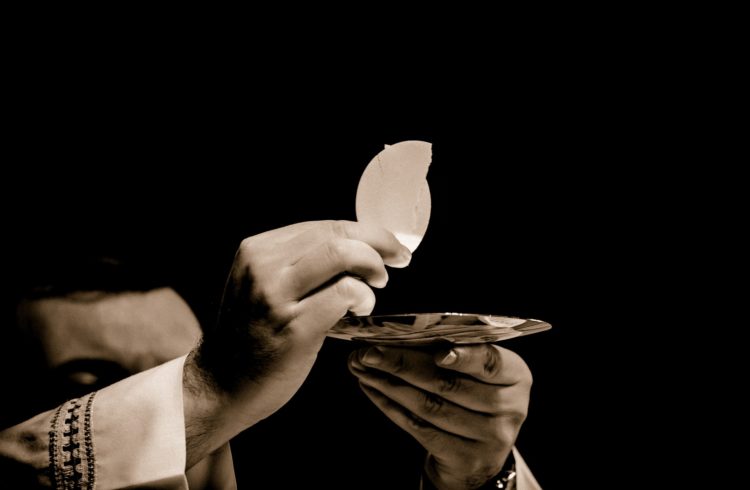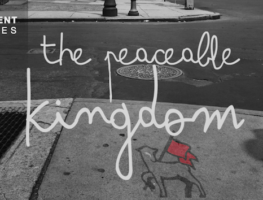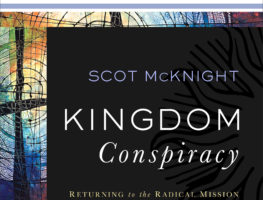Monuments are on our minds a lot these days as a nation, which makes this a good time to think about Communion, a central monument (of sorts) for Christians. The Communion (or the Eucharist, or the Lord’s Supper, depending on your tradition) in the language of the Scriptures is a memorial of the new covenant, to be practiced regularly by the Christian community to shape and energize its imagination, desires, and actions.
It tells us what event in the past is significant—the death and resurrection of Christ for our sake—and what the desired future looks like—the new creation where Christ is king.
This is a function that monuments dedicated to various heroes are also designed to perform. Monuments aren’t mere objects—they signify larger realities, powers and principalities, kingdoms. They seek to give an answer to the question: What power rules the hearts and minds, organizes social structures, defines reality, and demands worship, here in this place? Monuments signify larger realities, powers and principalities and kingdoms. Click To Tweet
And since Communion is a monument to the in-breaking of the Kingdom of God through the work of Christ on the cross, it serves as a counter-monument to all the kingdoms of this world that stand in opposition to it. Communion is a witness to God’s kingdom and a witness against the kingdoms of this world, including that of white supremacy. Communion is a counter-monument to all the kingdoms of this world. Click To Tweet
Communion as Monument Against Classism
I had a chance to reflect on 1 Corinthians 11 recently. This chapter contains a section, verses 23-26, which is often quoted during the Lord’s Supper as it is celebrated in churches around the world. Some churches will make sure to include also the next few verses in order to fence the table.
But I have found that the profound social significance of the Communion, preached in the verses preceding and following in this section, largely gets overlooked. Taking a closer look, we discover that Paul was talking about the Lord’s Supper in light of the classism that divided one part of the Corinthian church against another, that excluded those considered inferior from the inner circle of insiders who were considered superior.
In Paul’s days, churches usually didn’t own their own buildings for worship. Instead, churches met in people’s homes. Some of the richer Christians owned large homes where they housed not just their families but also servants; they even operated businesses out of their homes. So when the church got together for worship they gathered in these homes, specifically, in the large front rooms called oikos which were open to the street that could hold a small crowd, maybe 60 or even 70. There were also other more private rooms in the house, like bedrooms, dining room, and kitchen.
A problem arose when the Corinthian church got together for the Lord’s Supper. The master of the house was inviting some people into the dining room for a great feast, but not others. Who got invited in? The friends of the master of the house, who were, like them, rich. Who were getting left out? The poor.
In the private dining room, food and wine were plentiful. But in the courtyard, there was only the bread and a cup of wine. So the situation wasn’t that there was chaos at the table—a free for all—as many have interpreted. Neither was the problem that this was a sort of soup kitchen where some people were eating up all the food and not leaving any for others. Rather, the problem was classism. The rich were excluding the poor, and the poor were going hungry and getting left out. The rich, in the inner chambers, were getting full and even drunk, because they were eating and drinking too much.
It’s hard for 21st century Americans whose core tenet is the equality of all people to not see that this is a problem, but not so for the ancient Corinthians. Back then, when there was a festival or a special occasion, the rich folks hosted the community for a meal in their homes, but the servants and the poor didn’t get to enjoy what the rich did; they got the leftovers. Even at the same table, the privileged guests received better and bigger portions than the poor. Everyone took this for granted, because class was such a big part of how things were. So when the Corinthian Christians got together to celebrate the Communion, the cultural customs of the world were uncritically imported into Christian practice. Are the cultural customs of the world uncritically imported into our Christian practice? Click To Tweet
But Paul addresses this situation unequivocally. He says, in response to the classism at the Communion: “Do you despise the church of God?” and “…whoever eats the bread or drinks the cup of the Lord in an unworthy manner will be guilty of sinning against the body and blood of the Lord.”
Why so harsh? Especially when this was the prevailing cultural norm in Corinth? Because this division between the rich and the poor at the Communion table was anathema to the very heart of the gospel message and the nature of God’s kingdom. That’s why Paul uses language like “you’re not recognizing (or acknowledging or believing) the body and blood of Christ.”
For Paul, communion stood as a monument to Christ’s kingdom, which rejected any social structure that asserted that some were superior to others because of their wealth. Communion was a subversive practice because it signaled a far better kingdom where there was neither Jew nor Greek, slave nor free, male nor female, but all are one in Christ (Gal. 2:28). Communion is a monument to a Kingdom that rejects social structures asserting human superiority. Click To Tweet
Communion as Monument Against White Supremacy
The practice of communion, therefore, witnesses not only against classism, but also against sexism and racism.
In Ephesians 2-3, Paul speaks of the “mystery of the gospel,” the central reality that Christians confess, in this way: “through the gospel the Gentiles are heirs together with Israel, members together of one body, and sharers together in the promise in Christ Jesus.” (3:6) Paul is declaring here that Christianity, at its heart, is not a tribal religion. It is a global religion that has room for every cultural expression. And the Christian Church is one new eschatological ethnicity made of many.
It follows that any ideology sustained by a vision of one culture or race’s assertion over others denies the gospel, and Christians are obliged to renounce it. Communion offers to the people of God a very different vision—a vision of a city whose builder is God, a society of the redeemed from every nation, tribe, language who dwell together in perfect shalom, to God’s glory. This is the vision that sustains the Christian faithful, and the vision that should enable them to recognize that any other vision which does not conform to it falls far short and needs to be prophetically called out.
The vision of white supremacy is such a one. This doctrine has opposed the biblical teaching of imago dei and has served as the cause and justification of untold amount of suffering and oppression throughout the world, especially since the days of Columbus through colonization, resource extraction, slavery, etc. It is also true that the Western Church has largely been complicit, though not always. This in spite of what the Scriptures declare concerning the gospel message, and the fact that its central practice witnesses against ideologies such as white supremacy. It shows how the Church has too often been co-opted by the powers-that-be to bless the status quo instead of prophetically declaring the kingship of Christ in the face of it. The Church often blesses the status quo rather than declaring the kingship of Christ. Click To Tweet
Nevertheless, God’s kingdom and the kingdom of white supremacy are incompatible, and Christians need to make a stand and say so if they are to remain true to the gospel. Otherwise, as Paul would say, we may end up eating and drinking judgment on ourselves, because we have failed to recognize the body of Christ.
Communion as Monument to the Kingdom of God
When we as the body of Christ come to the Communion table, we come at the invitation of a Host who embraces a people redeemed from all nations, tribes, and languages, and we sit at the same table as the global people of God throughout the ages. We get nurtured by the vision of a new city of saints who cannot claim any worth over against another, for all are at the table by the grace of Christ. We get our heads screwed back on properly at the table, and awake from fear-fueled rumors and alternative realities to the reality of Christ. People who have been eating and drinking from this table should realize that they cannot continue to participate in Communion without repenting of racism or classism or any other way we have excluded or subjugated other divine image bearers who have also been invited to the table. We cannot participate in communion without repenting of excluding & subjugating other humans. Click To Tweet
When the people of God regularly come to eat and drink this truth deeply into themselves, they will be transformed into a people fit for his kingdom, their spirits will be nurtured by the power of new creation, and they will hear a call to action to go and declare the good news of reconciliation throughout creation.
This is a call to action that goes far higher than the low-hanging fruit of condemning some “ism” and distancing ourselves from obvious targets like hate groups (often that is all that is required of polite company). Instead, Jesus calls us deeper, farther, to a life of repentance, of lifelong transformation, of joining him in his kingdom. That means that we are being called to a life of building shalom community of justice and righteousness; to a a life of sacrifice and service for the sake of solidarity with our brothers and sisters in the Church catholic.
So take a look around the next time you are celebrating Communion. If we are participating in Communion with only those who are like us culturally, ethnically, and socioeconomically, that should signal that our practice of Communion is falling short of what God has in mind for his people. Communion must conform to and hold forth the beloved community of God’s kingdom. We need to go farther, deeper. What must we do differently? How must the community shaped by the Communion go against the grain of this world’s norm? When we celebrate Communion in the shadow of Charlottesville, is this not an opportunity to articulate what the kingdom of God is really like, and how different from the world it is, and offer it to the world as our lasting hope? This is how Communion ought to set the agenda for the gospel work of mission and reconciliation.
So fellow believers, come to the table set in the presence of competing kingdoms as a witness against them, and let us eat of Christ’s body and drink of his blood, that we may participate in the one kingdom that will not pass away. Then let us go out into our world that so desperately needs the good news of Christ’s victory over sin and death, as his catholic body gathered from all corners of the globe, and faithfully and joyfully declare his kingdom. The table is set in the presence of competing kingdoms as a witness of the eternal kingdom. Click To Tweet










Missio Alliance Comment Policy
The Missio Alliance Writing Collectives exist as a ministry of writing to resource theological practitioners for mission. From our Leading Voices to our regular Writing Team and those invited to publish with us as Community Voices, we are creating a space for thoughtful engagement of critical issues and questions facing the North American Church in God’s mission. This sort of thoughtful engagement is something that we seek to engender not only in our publishing, but in conversations that unfold as a result in the comment section of our articles.
Unfortunately, because of the relational distance introduced by online communication, “thoughtful engagement” and “comment sections” seldom go hand in hand. At the same time, censorship of comments by those who disagree with points made by authors, whose anger or limited perspective taints their words, or who simply feel the need to express their own opinion on a topic without any meaningful engagement with the article or comment in question can mask an important window into the true state of Christian discourse. As such, Missio Alliance sets forth the following suggestions for those who wish to engage in conversation around our writing:
1. Seek to understand the author’s intent.
If you disagree with something the an author said, consider framing your response as, “I hear you as saying _________. Am I understanding you correctly? If so, here’s why I disagree. _____________.
2. Seek to make your own voice heard.
We deeply desire and value the voice and perspective of our readers. However you may react to an article we publish or a fellow commenter, we encourage you to set forth that reaction is the most constructive way possible. Use your voice and perspective to move conversation forward rather than shut it down.
3. Share your story.
One of our favorite tenants is that “an enemy is someone whose story we haven’t heard.” Very often disagreements and rants are the result of people talking past rather than to one another. Everyone’s perspective is intimately bound up with their own stories – their contexts and experiences. We encourage you to couch your comments in whatever aspect of your own story might help others understand where you are coming from.
In view of those suggestions for shaping conversation on our site and in an effort to curate a hospitable space of open conversation, Missio Alliance may delete comments and/or ban users who show no regard for constructive engagement, especially those whose comments are easily construed as trolling, threatening, or abusive.